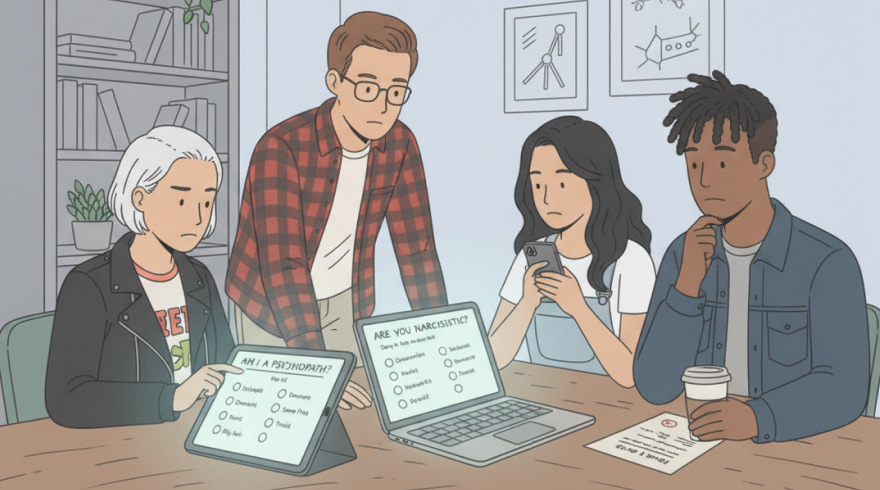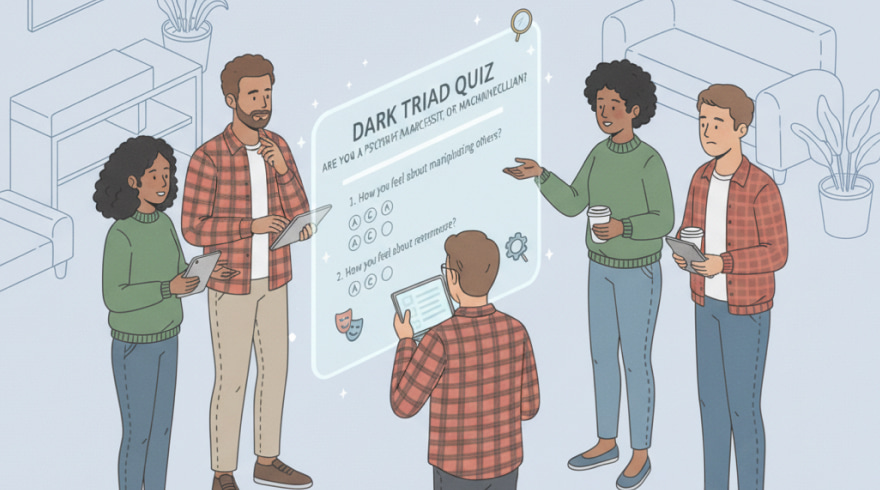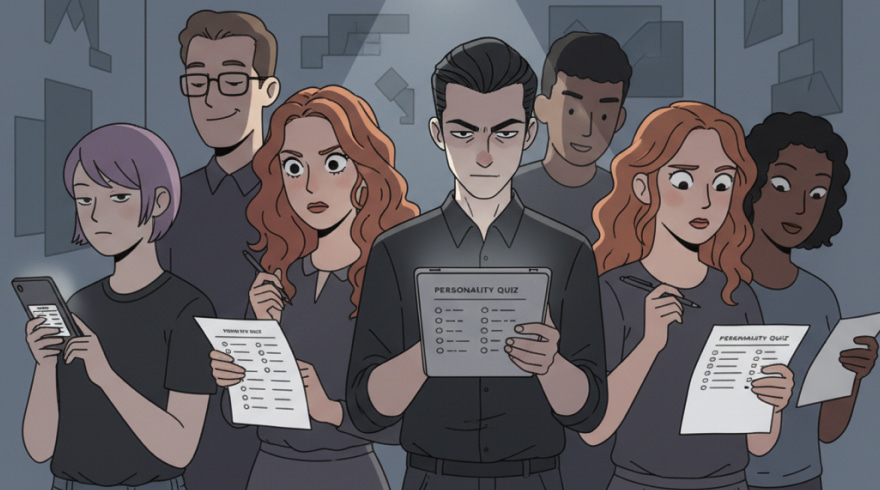Comprehensive Guide to Sociopathy Self-Assessments and Quizzes
- 10 November 2025

Understanding Online Sociopathy Screenings
People turn to self-assessment tools when they want a quick, private way to explore complex patterns in their thoughts, relationships, and boundaries. These questionnaires are usually brief, research-informed checklists that probe tendencies like empathy, rule-breaking, and emotional regulation. While such tools can spark insight, they cannot diagnose any condition, and results should be viewed as preliminary signals that invite reflection rather than definitive labels. If your answers raise concerns about harm to yourself or others, consider reaching out to a licensed mental health professional or a trusted support line immediately.
Most tools present neutral statements and ask how strongly you agree, then summarize patterns into an easy-to-read snapshot. Many readers eventually try a sociopath quiz to weigh traits like impulsivity, remorse, and manipulation within a structured format. Behind the scenes, scoring often emphasizes persistent behavior over isolated mistakes, which helps separate occasional lapses from recurring styles of interaction. Because context matters, honest, calm self-reflection produces far more meaningful results than rushed responses.
Titles vary across websites, and some options are marketed with catchy labels to grab attention. On directory pages, you might notice a prominent tile labeled the are you sociopath quiz that funnels to a short screening with sliding-scale answers. Clear instructions, confidentiality notes, and transparent scoring explanations are good signs that the creators value both clarity and user safety. As you browse, look for sources that cite psychology research, explain limitations, and offer resources for further learning.
Benefits and Responsible Use of Self-Assessments
Short screenings can be helpful when they guide people toward language for experiences that previously felt vague or unnamed. Many users appreciate the low barrier to entry: they can explore sensitive topics discreetly, without appointments or long wait times. In many collections you will see a link to an Am I a sociopath quiz, which is frequently used as a jumping-off point for learning about empathy, conscience, and interpersonal responsibility. The best tools encourage curiosity, self-compassion, and next steps like journaling, boundary-setting, or seeking professional input when warranted.
- Fast, private self-reflection that introduces key concepts without pressure.
- Clear examples that illuminate patterns in communication, trust, and accountability.
- Actionable ideas for healthier boundaries and conflict repair.
- Motivation to seek evidence-based education or counseling when concerns persist.
- Language to discuss worries with partners, friends, or clinicians more effectively.
It is wise to remember that nuanced traits exist on spectrums, and that no brief questionnaire can capture a full personal history. On multi-topic hubs, you might also spot the am i sociopath or psychopath quiz, which packages related material into a single, streamlined experience for newcomers. Responsible use means treating your score as information, not identity, then pairing those insights with real-world feedback and, if needed, professional evaluation.
What These Quizzes Measure and How to Read Results
Most self-checks examine clusters of behavior rather than isolated incidents, and they emphasize patterns that repeat across settings like work, home, and friendships. When sites condense multiple angles into one tool, the combined format may appear as a sociopath or psychopath quiz, which attempts to contrast rule-breaking conduct with emotional coldness or callousness. Results typically include brief descriptions of what high or low ranges may suggest in practical terms. The aim is not to attach a label but to help you notice habits that could be reshaped with education and support.
| Domain | Example Prompts | What Higher Scores May Suggest | Self-Reflection Tip |
|---|---|---|---|
| Empathy and Remorse | I notice or care about others’ distress after conflicts. | Reduced awareness of impact on others and limited guilt after harm. | Ask trusted people how your actions felt and what repair would look like. |
| Impulsivity and Risk | I act without planning and disregard consequences. | Frequent boundary crossing, legal issues, or unstable commitments. | Practice pause routines: stop, breathe, and consider two alternatives. |
| Manipulation and Deceit | I use charm or half-truths to get my way. | Transactional relationships and erosion of trust over time. | Track honesty slips and make timely, specific amends. |
| Responsibility and Rules | I respect agreements and follow through reliably. | Chronic rule violations and blame-shifting when confronted. | Adopt small, visible commitments and deliver consistently. |
To reduce misinterpretation, compare your answers across different life periods and notice whether the same themes persist. In roundups you may also encounter a compact sociopath psychopath quiz that condenses trait contrasts into a handful of high-yield items. Regardless of format, the most helpful next step is translating patterns into small behavior experiments, then observing how your relationships respond over time.
How to Take a Test Thoughtfully and Avoid Pitfalls
Preparation improves clarity, so consider taking a short walk, hydrating, and setting aside ten quiet minutes before starting. For combined assessments, readers sometimes land on a page featuring the are you a sociopath or psychopath quiz, which presents parallel question tracks to illustrate key differences. Read each item carefully, imagine a typical week rather than an exceptional day, and answer based on your own actions rather than intentions. If strong emotions arise, pause and return later with a calmer mindset.
- Avoid treating any online result as a diagnosis or destiny.
- Steer clear of confirmation bias by inviting contrary evidence.
- Do not use scores to label or attack others during arguments.
- Look for publishing dates and research references before trusting claims.
- Pair insights with tangible steps such as boundary plans or therapy referrals.
Accuracy also depends on honest self-observation and real-world feedback from people who know you well. On aggregator sites, a tile reading am i psychopath or sociopath quiz often links to a general screener, and users benefit from repeating it after life changes to see whether patterns shift. Keep notes about your responses, then revisit them monthly to gauge progress in areas like reliability, repair after harm, and empathy-building skills.
Relationships, Boundaries, and Safety
Concerns about a partner’s behavior can be emotionally taxing, especially when trust feels shaken by lies, volatility, or manipulation. During those searches, you may encounter the is he a sociopath quiz phrasing in forums that curate links, and it is vital to remember that a brief questionnaire cannot assess risk the way a trained clinician or advocate can. If you feel unsafe, create a safety plan, document incidents, and reach out to local resources such as counseling centers or domestic violence hotlines for confidential guidance.
When uncertainty looms, support networks and professional input help you sort patterns from one-off conflicts. Some people under stress will try the is my boyfriend a sociopath quiz variation, hoping to validate gut feelings after repeated boundary violations. No matter the outcome, trust your observations, set clear limits, and prioritize well-being; if change is possible, it will show through consistent actions, accountability, and respect for boundaries over time.
Choosing the Right Quiz and Knowing the Limits
Not all tools are created equal, so look for clear authorship, transparent scoring, and disclaimers about non-diagnostic use. Comparison pages sometimes highlight a sociopath vs psychopath quiz to explain how overlapping traits diverge in empathy, impulsivity, and calculated behavior. Favor questionnaires that are updated regularly, summarize limitations, and provide credible next steps such as psychoeducation resources, communication guides, and therapy directories.
Length, tone, and depth also matter, since overly brief items can overgeneralize while overly complex batteries may confuse newcomers. In many libraries, something labeled the am i a psychopath or sociopath quiz appears within a suite of related tools, and the most useful choice will match your goals, quick orientation, deeper learning, or support-seeking. Whatever you select, treat results as data points, keep perspective, and use insights to inform healthy, concrete actions in your daily life.
FAQ: Common Questions About Sociopathy Quizzes
Can an online questionnaire diagnose a mental health condition?
No, a web-based checklist cannot diagnose anything, and results should be treated as educational guidance rather than a clinical verdict. Only a licensed professional who reviews history, context, and standardized measures can offer an evaluation. Use online scores to identify questions to explore with a clinician, not to self-label or label others.
How accurate are these tools?
Accuracy varies widely by source quality, item design, and honesty of responses. Screeners that cite peer-reviewed research, clarify limitations, and provide reliability notes tend to be more trustworthy. Even then, life context, stress, and momentary mood can sway answers, so view results as provisional and repeat after stability returns.
What should I do if I’m worried by my results?
Consider journaling about specific behaviors that concern you, then share patterns with a mental health professional who can assess nuance. Focus on actionable steps like practicing repair after conflicts, building empathy skills, and setting reminders to follow through on commitments. If safety is a concern, contact local support services right away.
Is it ethical to test someone else indirectly?
Quizzing about another person can fuel confirmation bias and escalate conflict. It is more ethical to document concrete behaviors, set clear boundaries, and seek counsel from a clinician or advocate. If you feel unsafe, prioritize protective steps rather than trying to “prove” a label through online tools.
How can I use results constructively?
Translate insights into small, measurable experiments such as weekly check-ins, improved honesty habits, and calm decision routines. Ask trusted people for feedback about any changes they notice, and track progress over time. Pair self-education with professional guidance when patterns persist, intensify, or impair daily functioning.
Latest News
-
![A Complete Guide to Understanding the Dark Triad Quiz]()
- 7 November, 2025
-
![The Guide to Narcissism Self-Assessments: Insights, Benefits, and Smart Next Steps]()
- 6 November, 2025
-
![Your Complete Guide to Assessing Dark Triad Traits Online]()
- 5 November, 2025



